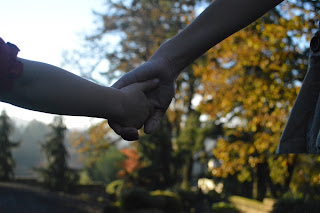“Because I’m the Mom!”
“Do it because I said so!”
“Don’t argue; just do
it!”
We’ve all been there, right? We’ve all been ones to say
these phrases. Well, not just say them, shout them from the top of our lungs. Usually
the argument prior to any of these phrases has been intense, Mom is at her wits
end, and the authority of being MOM or DAD is supposed to win the power
struggle. It may or may not have ended there. Maybe it didn’t, and now the power
struggle involves a spanking, or a slap on the face. Tears well up in that dear
child’s eyes, and in yours too.
No one is the winner.
I was right there. I still am there in many ways, but NOW, I
am learning to be a Child Whisperer.
In The Child Whisperer by Carol Tuttle, a new way of viewing
parenthood and children emerges. In reality, it is a new approach to this “Trap”
of power struggles, as I call it here. Instead of the attitude that Mom or Dad
is always right and that the children need to wordlessly obey, there is a
presence of mutual respect. There is understanding and cooperation, on both
ends.
Am I saying that the child should always get their way,
NO WAY!
Parents should always keep their role of guidance and teaching, of knowledgeable influence. But we can do it in a way that honors our children, and keeps us from guilt and regret.
NO WAY!
Parents should always keep their role of guidance and teaching, of knowledgeable influence. But we can do it in a way that honors our children, and keeps us from guilt and regret.
Just yesterday my son and I were in a power struggle. I had
asked him not to eat any more watermelon. A little while later he walked into
the kitchen, and took a piece of watermelon. I caught his hand to stop him. He
looked me in the eye, jerked his hand away and bit the watermelon.
 Before my Child Whispering days I would call that outright
rebellion. Now, I understand that it’s just his nature as a Energy Type 3 child
to be so determined that when I say, “NO!” it becomes a challenge to him. But
do I just let that go? “Well, I guess he’s
determined and it doesn’t matter what I say, he’ll do it anyway.” There are
times when I DO want him to immediately obey. Is eating more watermelon really
that important? No, but getting out of the house in case of a fire, or moving or stopping so that some other danger does not befall him or a sibling IS. So, where
is the line? Where and when do I push and when do I not?
Before my Child Whispering days I would call that outright
rebellion. Now, I understand that it’s just his nature as a Energy Type 3 child
to be so determined that when I say, “NO!” it becomes a challenge to him. But
do I just let that go? “Well, I guess he’s
determined and it doesn’t matter what I say, he’ll do it anyway.” There are
times when I DO want him to immediately obey. Is eating more watermelon really
that important? No, but getting out of the house in case of a fire, or moving or stopping so that some other danger does not befall him or a sibling IS. So, where
is the line? Where and when do I push and when do I not?
It came to a discussion. I explained the facts to him. I
told him I appreciated his determination to always reach his goals, that he had
a direct desire and that he honored that. I also told him that there were
sometimes that his goals might come in direct conflict with people of
authority: a parent, a teacher, a religious leader, a law officer. In these
situations, it was very important that he stop, re-think his goal, and honor
that person in authority. In the aftermath of our power struggle, I wasn’t sure
of its efficacy. Today, however, there were no arguments. He did what I asked
him to do without argument. He felt honored, and he honored back.
Carol Tuttle says, “Discipline at its best is educational,
instructional, inspiring, and motivation. It’s an opportunity to teach.” (The Child Whisperer pg. 340)
Isn’t that the goal of every parent? To teach, to instruct,
to inspire, to motivate, to guide our children to success. The "Parent Trap" we
fall into is a path of force, of punishment, even sometimes of spite and pride.
We want our kids to obey because, well, because we are the parents. We think it
would be easier to force, to demand; and we feel it would be gratifying to have
our kids obey in an instant, no matter what, even if it goes directly against their nature. For example, maybe your daughter is shy and wants to play alone instead of with the friends you invited over for dinner. Do you badger her to play with them? Or respect her choice? Or what about the son who does NOT want to share his special toy? Do you honor that desire, or punish him for not sharing?
I’m excited that I had the eyes to pin point this “trap”
that was ensnaring me. Do I want my kids to do something just because it might be better for me? or because that is the 'right' thing to do?
These are the amazing
insights that The Child Whisperer gives into our own true nature, and that of our children.
I look forward to
the many years ahead of me, as I work to build relationships with my children
that are based on love and honor for each other just as we are.


